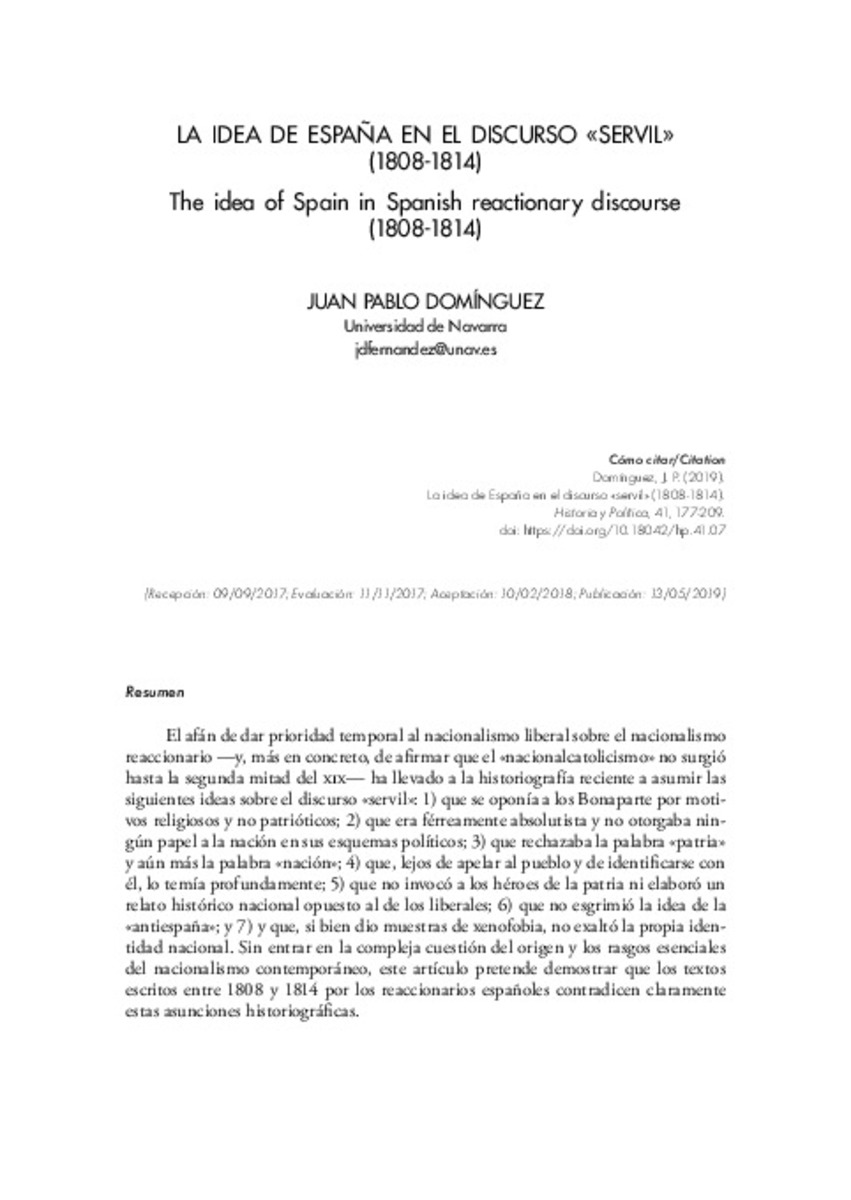Full metadata record
| DC Field | Value | Language |
|---|---|---|
| dc.creator | Dominguez, J. P. (Juan Pablo) | - |
| dc.date.accessioned | 2019-08-19T08:30:44Z | - |
| dc.date.available | 2019-08-19T08:30:44Z | - |
| dc.date.issued | 2019 | - |
| dc.identifier.citation | Dominguez, J. P. (Juan Pablo). "La idea de España en el discurso "servil" (1808-1814)". Historia y Política. , 2019, 177 - 209 | es |
| dc.identifier.issn | 1575-0361 | - |
| dc.identifier.uri | https://hdl.handle.net/10171/58043 | - |
| dc.description.abstract | El afán de dar prioridad temporal al nacionalismo liberal sobre el nacionalismo reaccionario —y, más en concreto, de afirmar que el «nacionalcatolicismo» no surgió hasta la segunda mitad del XIX— ha llevado a la historiografía reciente a asumir las siguientes ideas sobre el discurso «servil»: 1) que se oponía a los Bonaparte por motivos religiosos y no patrióticos; 2) que era férreamente absolutista y no otorgaba ningún papel a la nación en sus esquemas políticos; 3) que rechazaba la palabra «patria» y aún más la palabra «nación»; 4) que, lejos de apelar al pueblo y de identificarse con él, lo temía profundamente; 5) que no invocó a los héroes de la patria ni elaboró un relato histórico nacional opuesto al de los liberales; 6) que no esgrimió la idea de la «antiespaña»; y 7) y que, si bien dio muestras de xenofobia, no exaltó la propia identidad nacional. Sin entrar en la compleja cuestión del origen y los rasgos esenciales del nacionalismo contemporáneo, este artículo pretende demostrar que los textos escritos entre 1808 y 1814 por los reaccionarios españoles contradicen claramente estas asunciones historiográficas. | es_ES |
| dc.description.sponsorship | Many recent scholars have assumed that liberal nationalism arose long before reactionary nationalism, and more specifically, that Spanish “national Catholicism” did not emerge until the second half of the 19th century. This assumption has led a number of noted historians to embrace the following ideas concerning the political discourse of the so-called “serviles”: 1) that it opposed the Bonapartes for religious and not patriotic reasons; 2) that it was thoroughly absolutist and did not grant any role to the nation in its political schemes; 3) that it rejected the word patria and even more the word nation; 4) that it deeply feared the people; 5) that it did not invoke the heroes of the fatherland or elaborate a national historical narrative opposed to that of the liberals; 6) that it did not espouse the idea of the “anti-Spain”; and 7) and that it showed signs of xenophobia but did not exalt the Spanish national identity. Without pretending to solve the much debated question of the origins and nature of modern nationalism, this article shows that the reactionary texts published in Spain between 1808 and 1814 do not support any of these historiographical assertions. | es_ES |
| dc.language.iso | spa | es_ES |
| dc.publisher | Centro de Estudios Políticos y Constitucionales | es_ES |
| dc.rights | info:eu-repo/semantics/openAccess | es_ES |
| dc.subject | Serviles | es_ES |
| dc.subject | Reaccionarios | es_ES |
| dc.subject | Nacionalismo español | es_ES |
| dc.subject | Nacional catolicismo | es_ES |
| dc.subject | Guerra de la Independencia | es_ES |
| dc.subject | Materias Investigacion::Ciencias Sociales | es_ES |
| dc.title | La idea de España en el discurso "servil" (1808-1814) | es_ES |
| dc.title.alternative | The idea of Spain in Spanish reactionary discourse (1808-1814) | es_ES |
| dc.type | info:eu-repo/semantics/article | es_ES |
| dc.editorial.note | Este obra está bajo una licencia de Creative Commons Reconocimiento-NoComercial-SinObraDerivada 4.0 Internacional | es_ES |
| dc.identifier.doi | 10.18042/hp.41.07 | - |
| dadun.citation.endingPage | 209 | es_ES |
| dadun.citation.publicationName | Historia y Política | es_ES |
| dadun.citation.startingPage | 177 | es_ES |
Files in This Item:
Statistics and impact
Items in Dadun are protected by copyright, with all rights reserved, unless otherwise indicated.






